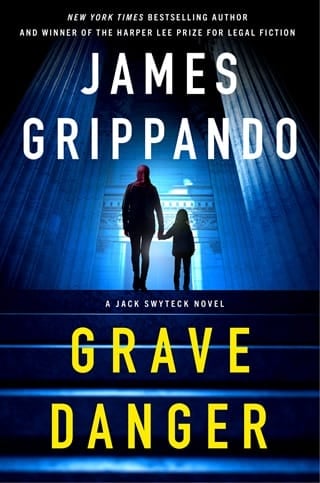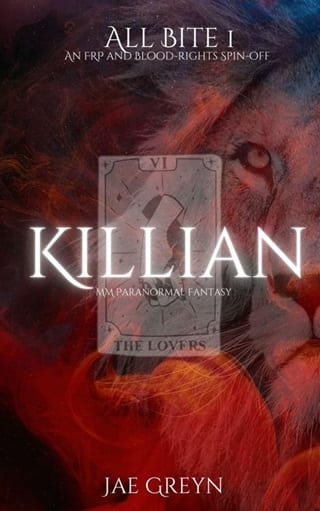Chapter Twenty-Four
Chapter Twenty-Four
At first there is no sound, and then only the scything of blades. The Woodsmen on the wall lurch forward, axes drawn, and descend on the dais like crows over carrion. They have their weapons at the throats of the princes, including Gáspár, before the guests can even start clamoring for the door. A black shadow washes over the threshold: more Woodsmen, their blades flashing, barring every exit.
Nándor removes the knife from his father’s back with a gentle twist.
“My dear friends,” he says, voice rising over the sounds of their screaming and the winking of jewels on fingers and throats as the guests roil together in the terrible hot hall, “there is no need to be afraid.”
“You’ve killed him!” someone cries. “The king is dead!”
“Yes,” Nándor says. Blood has begun to seep down the stone floor, like tributaries on a map marked in red ink. “And now a new rule can begin.”
“But the laws of succession—” another guest starts.
Before they can finish, the Érsek hobbles up to the dais, robes trailing through the king’s blood. Seeing him pick his way around King János’s body like he would a puddle of muck in the road is what finally jolts me from my stupor. I let out a half-mute stammer of protest, unheard over the clamoring guests. The Woodsmen have grasped Katalin, jerking her arms behind her back.
“The Patritian laws of succession are subject to interpretation by the church’s authorities,” the Érsek coughs out. “The Prinkepatrios has chosen me to interpret his laws, and so I have chosen a new king, to lead our nation out of darkness.”
“Isn’t it convenient,” Gáspár says, straining against the knife at his throat, “that Godfather Life has changed his views on the rule of succession to put you in power?”
He speaks to Nándor, voice lancing through the crowd’s uncertain tittering. A word floats up from the throng, its three hard syllables like dropped stones. “Fekete.”
Nándor’s face is as pale as Saint István’s marble statue, smooth and unweathered by time. “Convenient? No. This is a burden that the Prinkepatrios has placed on me, brother. I don’t presume to argue with His judgment. Do you? Do you?” he presses, turning to the men and women gathered in the hall. “Those who have been loyal to me will receive many blessings, and a great bounty in heaven. And those who defy me—well, you defy the will of God.”
The dagger of his stare cuts right to Gáspár as he says it. The crowd murmurs again, someone choking out a sob. Some unnamable black thing is pooling in my belly, an awful oily mingling of fear and dread and utter, complete despair. The turul lies in the spill of King János’s blood, eyeless.
There is a rustling behind the row of soldiers guarding the threshold, and the line breaks to let another Woodsman through. The front of his dolman is gashed, his face blood-flecked. He is dragging something behind him, a mangle of ruined flesh and torn silk, sinew stretched like pink cables over a gutted chest. It’s not until I see the yellow curve of a bear’s claw that I recognize it as Count Korhonen.
“Apologies, my lord,” the Woodsman pants. “Furedi and Németh managed to escape and flee to their fortresses.”
Nándor’s gaze flickers to Count Korhonen’s body, over the arc of his collapsed rib cage. His eyes are glazed, slick, like stones in the riverbed.
“No matter,” he says. “I will send the Woodsmen to root them out and bring them to kneel before me, or else die.”
“We have put the other Woodsmen in chains,” the panting soldier goes on. “After a week in the dungeon with no food or water, I suspect they will be clamoring to embrace their new king.”
The soldiers, the soldiers, where are the other soldiers? I wonder desperately. The Woodsmen are all raised in the strangling grasp of the Patrifaith, but the soldiers of the king’s army are ordinary men, with wives and sons and daughters, less likely to want to bleed for the lofty ideals of princes and kings. But then I remember that every legion King János could scrape together is in Akosvár, a seawall against the tide of the Merzani army.
“Good,” Nándor says. “For if they don’t, they can join the demon Thanatos.”
At the sound of his name, a shudder runs through the crowd. The men and women give full-bodied quakes, like the word itself is a ghost to be exorcised. I squeeze my own eyes shut, wishing the star-daggered blackness would swallow me. When I open them again, Nándor has leapt back up onto the dais, running his hand down the edge of his father’s throne with the hungry gaze of a dog in heat.
“Ah, my lord,” the Érsek says. “What is a king without a crown?”
Nándor blinks, then looks back at the priest. His eyes rest on the Érsek for one long moment. “Of course.”
Then he leaps down the dais and snatches up the king’s crown of fingernails. My heart thrashes like willow branches in the wind, my throat and stomach burning. Nándor gestures to the nearest Woodsman, the one who dragged in Count Korhonen’s body. “Sir, if you please.”
The Érsek wheezes out a protest—it’s his duty to crown the king, after all—but the Woodsman comes forward and clasps his hands.
“Megvilágit,” he whispers. A fist of flame closes around the king’s body, orange fingers catching on his ruined dolman, his blood-slick mente. It spreads sickly, like a strewing of lambent petals, gleaming red and gold. The smell of burning hair fills my nose, along with the ugly char of bone. I almost retch.
Nándor tosses the crown into the fire. It chokes and splutters, and for a moment burns a bright, sharp blue, streaming up nearly to the ceiling, where the chandeliers groan and sway. When it calms and cringes orange again, the crown is nothing but ash. Sad embers crawl over the stone floor like blinkering fireflies.
My mother’s fingernails, the fingernails of eleven other wolf-girls—gone, and all their magic with them. My bargain with the king and his promises to keep the Yehuli and Keszi safe are smoke in the air.
“A true king’s crown is no hideous thing, suffused with pagan magic,” the Érsek proclaims, with as much gravity as he can manage in his thin voice. “The crown of a true king is a beautiful thing to look upon, and it is forged in pure gold.”
All through the room, hands grasp at iron pendants. Voices weave and tangle like a thousand dark threads. They lace around his ankles and shoot up, up, up through his arm and coil in his mouth, until the words that leave his parted lips are echoed by a hundred others.
“Bring him,” Nándor says. The smile on his face is blissful and horrible.
He gestures to the Woodsmen guarding the door, and they part again, this time for another man to stumble through. He is slight of build, dressed in plain merchant’s clothes, with limp gray curls and a stubborn mouth that is better suited to frowning than smiling. Zsigmond.
Until now, my panic has been a caged thing, manacled by the knowledge that I am surrounded by Woodsmen on all sides, and that my magic is gone. Something looses in me and I am screaming, all that numb terror burst like a bloodletting, plunging through the crowd toward the dais. The Woodsmen are on me before I can make it within steps of Nándor. The blade of an ax presses between my shoulder blades, and someone jerks my arms behind my back.
Gáspár lurches forward, the Woodsman’s knife drawing a line of blood along his throat. “Don’t touch her—”
“Quiet the wolf-girl,” snaps the Érsek.
Lajos stalks forward and claps a heavy gloved hand over my mouth. I keep screaming anyway, until he pinches my nose shut and I turn light-headed and dizzy. Tears cloud my vision. All I can see is Zsigmond’s doomed march up to the dais, knees quaking. When he gets there, he bows his head and kneels.
Nándor returns him a flimsy smile, then turns to address the crowd. “The Yehuli are a blight on our city, friends,” he says. I choke against the hot press of Lajos’s hand. “But I am told there is no finer goldsmith in all of Király Szek.”
Perhaps there is some seed of truth in it, but what is truer than anything is this: Nándor wants to wound me in whatever way he can. I struggle to meet Zsigmond’s eyes, and when I do, I see that he is crying too. Quiet, dignified tears, nothing like my own.
“A crown, then,” he says to Nándor, voice low and rough, “for our new king.”
A wooden workbench is brought for him, and on it a gleaming block of gold. There are no tools, not even a hot kettle with a flame hissing under it, but Zsigmond doesn’t ask after any. He steps forward and puts his bare hands on the gold, palms flattening against it, feeling its shape and its heft. Then, without a word, he takes a finger and traces something onto its surface, once and then again, and it’s three times before I recognize what it is: emet. Truth.
He traces and traces until the gold turns to something like clay in his hands. He holds it in a way that reminds me of Virág kneading dough. Sweat pearls around his hairline, dampening his curls. And then, into the soft gold, he traces something else, letters I don’t recognize at first. But he traces them so many times that eventually I can make out the shapes of the kaf and the tav and the resh and the little dots and dashes that fill in the rest of the sounds. He is tracing the Yehuli word for crown.
It seems to come into the shape almost by itself, as though he’s imbued the gold with its own sort of mind, a lumbering cleverness, the way the rabbi did the clay-man that he carved up from the riverbed. The crown is a thick circlet with a domed top, lined with filigree plates and strands of gilt beads that hang down and finally, at its peak, the three-pronged symbol of the Prinkepatrios. My father traces more words, words that I don’t know, and they etch delicate patterns into the gold, the heads and shoulders of saints and feathery outlines of holy fire. When Zsigmond finishes, he’s panting.
Nándor leans close to the workbench, candles casting the crown’s golden light along the curves of his face. He runs the pad of his thumb around the edge of it, tracing the shapes of the saints, every filigreed frond of flame. He smiles again, but he does not put it on.
“Stories of Yehuli craftsmanship have not been exaggerated,” he murmurs. “And you, Zsidó Zsigmond, are gifted even for your kind.”
“Yes,” Zsigmond says evenly, placing one trembling hand flat on the workbench. “I have upheld my oath and made your crown. Now you must uphold yours: leave the Yehuli be.”
The word oath strikes my heart like an arrow. I strain against Lajos’s grasp, but it’s useless, and I’m far too late, anyway. Far too late to have told Zsigmond what he needed to know: that you should never strike a deal with a Bárány.
Nándor’s gaze travels lazily to the Woodsmen beside the dais.
“Soldiers,” he drawls, “seize him.”
They have Zsigmond’s arms behind his back before I can even scream again. By the time they are dragging him away, Lajos has pinched his fingers over my nose once more, leaving me breathless, head throbbing and vision warping as tears burn salt trails down my cheeks. Putting my faith in King János was like boarding a ship with green rot in its hull and hoping that it wouldn’t sink. But Zsigmond making a deal with Nándor is like asking the river for mercy as its black water fills your lungs.
I think of Yehuli Street, looted and empty, Jozefa and Batya fleeing as torchlight shines bright on their terrified faces.
The Érsek ambles toward the dais. “But won’t you let me crown you today, my lord, in the sight of all your honored guests?”
“No,” Nándor replies, and the Érsek gives a little shudder, as if unmoored by his defiance. “No, my coronation will take place tomorrow, and it is my dear brother who will place the crown on my head.”
He has all four of his brothers at blade point but it’s Gáspár he addresses, Gáspár he bounds up the dais to see. He leans close to him, their noses nearly touching. From my vantage point they look like skewed mirror images of each other, Nándor’s face washed and pale, no more than a vague, jagged shape under ice.
“Never,” Gáspár says, his throat bobbing beneath the Woodsman’s blade.
“I suspected you might refuse,” Nándor says. “You would easily offer your own life as forfeit, being the gallant Woodsman that you are, but what about the lives of your brothers?”
He shifts toward Matyi, who is shivering in his bright-green dolman, eyes pressed tightly shut. Gáspár flinches, but he doesn’t rise to Nándor’s threat. Blood from his earlier wound is gleaming ruby-bright in the hollow of his collarbone.
“If you do as I say and place the crown on my head, I will take your other eye and let you leave with your life, so long as you never return to Régország again. Perhaps the Merzani will welcome their blind, half-breed son back home.”
Gáspár swallows. “And the wolf-girl. Évike. You won’t lay a hand on her.”
As Nándor’s head swivels toward me, so does every gaze in the room. A smile curves over his face, thin and red as a knife wound.
“That I will not swear to you, brother,” he says. “Tomorrow, at my coronation, the wolf-girl will die by my hand, and a hundred more deaths will echo in its wake, for my first act as king will be to destroy the pagan villages in Ezer Szem.”
There is no strength left in me to scream, but a sob tears out of my throat, my breath hot in the shell of Lajos’s hand.
“Now,” Nándor says, rising, “there is the matter of our dear Érsek.”
The Érsek blinks at Nándor, perfectly sedate. “Yes, my lord?”
“What am I to do with you?” Nándor tilts his head. “What shall I do, when I am king of Régország, with an archbishop who helped murder the last two kings of Régország?”
This time there’s no sleepy blinking, no slow, animal twitches. The Érsek stands suddenly stiff and tall, his eyes bright.
“Yes, my lord,” he says, without coughing or wheezing once. “I awaited a true king, one who would earn my loyalty and the blessing of the Prinkepatrios, one who I would never think to betray.”
“And I’m sure you swore that same oath to my father, after you helped him murder Géza,” Nándor says coolly.
Silence blankets the Great Hall like new fallen snow. I think of the statues in the courtyard, of Géza with his beard as long as dripping moss, of how he was called SzürkeGéza, or Géza the Gray, even though he never lived past middle age.
“Never, my lord.” The Érsek’s voice is silken. “I am loyal to you, now and always. I only helped your father murder Géza because I could sense his weakness, and I helped to murder Elif Hatun because King János asked me to.”
“Elif?” Gáspár rises to his feet even as the Woodsman’s blade draws a jeweled collar of blood around his throat. “Elif Hatun, the queen?”
The Érsek dips his head. “It was a quick poison, procured from a Rodinyan apothecary, which mimicked the symptoms of a fever. King János asked that I use it on his father, and then again his wife.”
“Enough,” Nándor says. A rosy flush has come over his face, the color of dawn at its earliest hour. “Do you think I care for the life of my weak-willed grandfather or that Merzani dog?”
For a moment, I think that Gáspár might lunge for him, and fear coils hard in my throat. Please, I want to say, though Lajos’s hand is still pressing hard over my nose and mouth. Please don’t be a lofty-minded martyr. Nándor’s eyes are as pale and hard as bits of ice, and the whole room is roiling with its piety.
“Nándor,” the Érsek croons. It’s a terrible sound, like the braying of a mule. “My child, remember what we have done together. Remember who breathed the power of the Prinkepatrios into you, when the cold had stopped your heart beating—”
“You have done nothing,” Nándor snarls. “I was blessed, and you merely brought me to this city so that I might make it holy too.”
“No, Nándor,” the Érsek says. “I brought a frightened peasant boy, his skin still marbled blue from the cold, and I made you into the people’s hero. You should not have lived at all, but Godfather Life took mercy on you and then I took His mercy and molded it. Can a saint ever be holier than the one who consecrated him?”
The Érsek’s boldness is almost to be admired. As if in agreement, Nándor doesn’t move, not really, but a tremor goes through him, like lightning fissuring across a still, black sky. The hall is lush and heavy with silence, a rain-swollen cloud near to bursting. Finally, Nándor lifts his head.
“I’m afraid,” he says, “that your time as archbishop has come to an end.”
I recognize the look in his eyes, despite all their snow-frosted sharpness. It’s the look of a child who’s grown too tall and strong to be cowed by his father’s whip, the look of a dog who has been lashed one too many times.
For one suspended instant, I really do believe he will let the Érsek live. Perhaps he will strip him of his title and his brown robes and banish him, like he plans to do with Gáspár. In this fleeting second of frozen time, I am convinced that Nándor will choose mercy.
Then the whisper of a prayer glides off his lips.
There’s a sound like ice breaking and the churn of freed water. The Érsek’s neck snaps back at a gruesome angle, but he’s still alive; there’s a hazy gleam of terror in his eyes as he’s lifted off the ground. An invisible hand drags him forward before dropping him into the vacant throne, bonelessly limp. Nándor prays again, something longer this time, with the cadence of a song, and a great iron crown glimmers onto the Érsek’s head.
The Érsek whimpers, perhaps garbling for a prayer of his own, but only spittle foams at the corners of his mouth, dyed the pale red of diluted blood.
I try to close my eyes, but some perverse urge keeps them open. I know that whatever happens now, my imaginings will only be worse. The crown gleams with a smoldering heat, rippling like glass in the sunlight, shiny enough for Nándor’s face to pool warped and smiling on its surface. The Érsek screams hoarsely as the hot iron sears through his skin, down to the white dome of his skull. Blood rises in the riverbed of his throat and bubbles out of his ears.
The hall fills with retching and sobbing, the cobbled noises of horror. Some of the guests scramble for the doors, but the Woodsmen are packed shoulder-to-shoulder in the threshold like sentries, looks of blank, stupid devotion on their faces.
The skin of the Érsek’s forehead melts and crumples over his eyes. He can’t even scream anymore, for all the blood in his mouth.
In another moment, it’s done. The Érsek’s body topples out of the throne, a mound of blood-drenched brown robes and stinking flesh like warm pink candle wax. Nándor bends delicately over the corpse.
“Do not be afraid, good people of Régország,” he says, lifting the Érsek’s iron chain off his body and winding it around his throat, instead. “I am both royalty and divinity now.”
Water skims across my skin like the edge of a blade, hot and cold at once. I look up from under my damp hair at the Woodsman who holds the now-empty bucket. It’s a Woodsman I’ve seen before, one with a missing ear. The absence of it makes his head look lopsided. Like a tree with branches but no roots.
“What’s the point?” I ask through chattering teeth. “I’m going to die tomorrow.”
“The king wants you to look clean,” the Woodsman says. “I don’t ask questions, nor should you.”
“He’s not the king yet,” I say.
When I’ve been cleaned to Nándor’s satisfaction, and even my wolf cloak brushed and made to shine, I’m brought to my old bedchamber. I try, in a hopeless and perfunctory sort of way, but the iron bars on the window hold fast, the door is tightly sealed, and my magic is well and truly gone.
I want to cry again, only because it seems the proper thing to do. But all my tears have been ground out of me, like dead skin scrubbed off a wound. Instead I fold myself against the eastern wall, where the sun will rise tomorrow on the day of my execution, my face flush against the cool stone.
The memories of my mother’s comforts are distant and removed, the tenor of her hushing and the feel of her palm on my forehead nearly lost to me now. But I do remember Virág’s comforts well. Her six-fingered hands could comb through my hair as nimbly as a squirrel leaping among the branches, and on the days I came to her hut weeping, she sat me down by the hearth and brushed my hair and braided it until all my tears had dried. The memory seems as pale and hollow as the inside of a conch now, drained of all its warmth. I think of Zsigmond holding me to his chest, but that memory feels twice-removed, too, like I’m remembering a ghost. Tomorrow, he will likely be dead, too, and all of Yehuli Street abandoned.
This is the wretched state of my mind when the door swings open. Two Woodsmen shoulder through, carrying another man between them. He is bare-chested, his blood leaking onto the stone floor. Gáspár.
I lurch to my feet, heart throbbing its jagged beat, but before I can manage a word the Woodsmen have hefted him onto the bed. Then they turn on their heels and vanish, the door thudding shut behind them.
Gáspár lies facedown, unmoving. The expanse of his back is etched so thoroughly with lash wounds that it’s a fretwork of flesh and blood, gleaming braids of red stitched through with pink. The sight of it, and the copper stench in my nose, and the faint moan that feathers through his parted lips—it all makes my chest ache unbearably. And then I do cry, tears stinging the corners of my eyes, as I take Gáspár’s head into my lap and brush back the curls from his sweat-damp forehead.
After a few moments, his lashes flutter and he looks blearily up at me. “Did he hurt you?”
“No,” I say, and laugh at his absurd unselfishness in spite of myself. The laugh sounds all wrong, like a river bubbling over and flooding someone’s sod house. “He won’t hurt me until morning.”
He lets out a breath, and very slowly, his arms move to circle my waist. Pain draws deep furrows on his brow. I’ve never felt so limp and miserable before, paralyzed by my love. This is the feeling, I think, that keeps mother deer loping after their feeble and defenseless fawns. A mad thing, really, that makes you so terribly attuned to mortality, to the soft places where throats meet jaws, to the hawks circling overhead and the wolves lurking just beyond the tree line. I lean over and press my lips to his hair.
“Will you tell me a story, wolf-girl?” he mumbles against my thigh. In his mouth the epithet is toothless, even tender.
“I think I am all out of stories now,” I confess.
His soft laugh warms my skin through the fabric of my dress. “Then let’s just sleep.”
We don’t, though. Not yet. We sit. We breathe. We speak in hushed tones, as if there were someone else here we might risk waking. I do tell him the story of the rabbi and the clay-man, in the end. I tell him about Queen Esther too. We stumble through some Old Régyar. I let Gáspár teach me a few words of Merzani, and they coat my tongue like a sip of good wine. We hold each other all through the night, until the sun rises.
 Fullepub
Fullepub 



